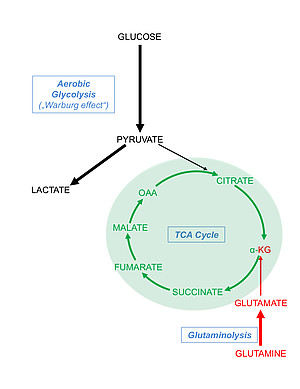Sie befinden sich hier
Inhalt
Metabolic Alterations in Liver Cancer
The ability of cancer cells to adjust their metabolic needs, e.g. during starvation, is one mechanism through which they perpetuate their growth and resist treatment. Liver cancer is highly malignant and drug resistant; hence understanding its metabolism could broaden the chances of identifying effective therapeutic options. Above all, because the liver is itself the most important organ in systemic metabolism, it is of extreme importance – at least from a therapeutic standpoint – to distinguish its metabolic features from that of a cancerous liver.
Making such distinctions is necessary in order to ensure that anti-metabolic therapies intended for liver cancer, has the least possible side effect on normal hepatocytes. Therefore, my project aims to: (a) expose metabolic pathway alterations (see Figure) and (b) investigate their relevance to liver cancer progression. Specific objectives include identifying the differences between metabolic activities in normal versus cancerous liver, and the potential benefits of inhibiting metabolic pathways in liver cancer. Methods or materials used in this project include gene expression profiling, metabolomics, immunotechniques, functional assays, bioinformatics tools, tumour xenograft and clinical HCC samples.
Kontextspalte
Contact person

Prof. Dr. rer. nat. Steven Dooley
Molecular Hepatology
Phone +49 621/383-3768
Fax +49 621/383-1467
PhD- or Masterthesis
If you are interested in performing your Master or PhD/MD in our group, please contact Prof. Dr. rer. nat. Steven Dooley or go to
https://doktorboerse.fimm-online.de/index.php?action=show&inst=7
or
Publications
Publications of this group can be found on pubmed.
Grants
- BMBF (LiSyM, GoBio)
- DFG
- CSC – Chinese Scholarship Council
- Chinesisch-Deutsches Zentrum für Wissenschaftsförderung

